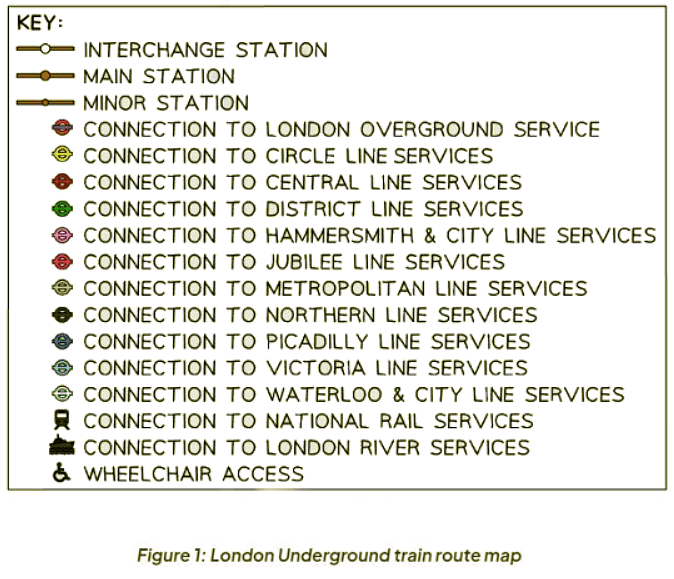Year 11 Exam > Year 11 Notes > Computer for GCSE/IGCSE > Program Development Life Cycle - Analysis
Program Development Life Cycle - Analysis | Computer for GCSE/IGCSE - Year 11 PDF Download
Abstraction
Abstraction involves filtering out irrelevant details of a problem to concentrate on crucial elements. For instance, the London underground train route map serves as an abstraction, where travelers don't need to grasp the geographical layout of routes, but simply recognize that boarding at stop A leads to stop B.

 Figure 2: The geographical London underground train map
Figure 2: The geographical London underground train map
Requirements
- Identification of the problem: Before delving into a problem, it is imperative that all team members have a clear understanding of the issue at hand. This involves defining the ultimate goal of the solution and any restrictions, such as resource constraints or the need for a platform-specific approach.
- Requirements: In order to craft a solution, it is necessary to create a requirements document. This document plays a crucial role in outlining the problem and breaking it down into manageable segments through abstraction and decomposition. Each requirement is detailed with a description and success criteria that serve as benchmarks for achievement.
The document Program Development Life Cycle - Analysis | Computer for GCSE/IGCSE - Year 11 is a part of the Year 11 Course Computer for GCSE/IGCSE.
All you need of Year 11 at this link: Year 11
|
92 docs|30 tests
|
FAQs on Program Development Life Cycle - Analysis - Computer for GCSE/IGCSE - Year 11
| 1. What is the Program Development Life Cycle? |  |
Ans. The Program Development Life Cycle refers to the process of creating a software application, starting from the initial idea to the final product. It involves various stages such as planning, analysis, design, implementation, testing, and maintenance.
| 2. Why is analysis an important stage in the Program Development Life Cycle? |  |
Ans. Analysis is a crucial stage in the Program Development Life Cycle as it involves gathering requirements, understanding the problem, and defining the scope of the project. It helps in identifying the needs of the end-users and ensures that the software meets their expectations.
| 3. What are some common tools used during the analysis stage of the Program Development Life Cycle? |  |
Ans. Some common tools used during the analysis stage include data flow diagrams, entity-relationship diagrams, use case diagrams, and requirement gathering techniques such as interviews, surveys, and questionnaires.
| 4. How does the analysis stage of the Program Development Life Cycle impact the overall success of a software project? |  |
Ans. The analysis stage sets the foundation for the entire software project by defining the requirements, constraints, and objectives. A thorough analysis helps in avoiding misunderstandings, reducing rework, and ensuring that the final product meets the needs of the stakeholders.
| 5. Can the analysis stage of the Program Development Life Cycle be skipped or minimized in a software project? |  |
Ans. Skipping or minimizing the analysis stage can lead to misunderstandings, scope creep, budget overruns, and ultimately project failure. It is essential to invest time and effort in the analysis stage to ensure the success of the software project.
Related Searches





















